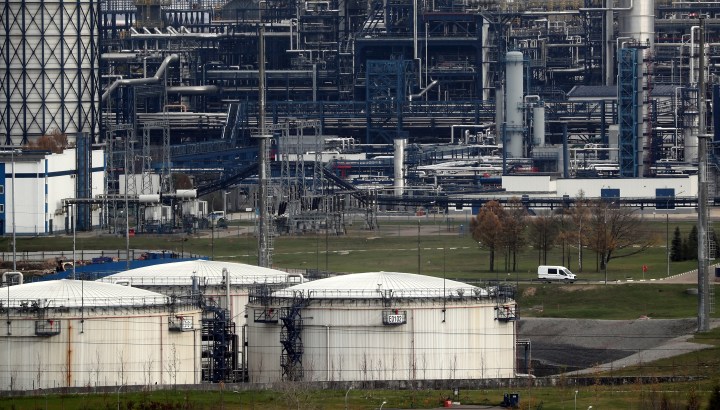UKRAINE UPDATE: 5 DECEMBER 2022
US focuses on ending Iran weapons flow to Russia; Zelensky derides oil price cap

The US will concentrate on Iranian weapons supplies to Russia rather than on stalled talks to revive an international nuclear deal, the Biden administration’s top Iran envoy said in an interview.
President Volodymyr Zelensky called the $60 a barrel price cap on Russian crude a sign of weakness toward Moscow. The cap agreed on by European Union countries is higher than the price at which Russian oil has been trading recently, and the Kremlin said it’s preparing a workaround in any case. Russia’s deputy prime minister warned Russia could “somewhat reduce output” in response.
A “wealthy Russian businessman” has been arrested in London on suspicion of money laundering, the UK National Crime Agency says. The man and two others were released on bail.
French President Emmanuel Macron said his planned talks with Russia’s Vladimir Putin will focus on civilian nuclear issues.
Key developments
- Ukrainian troops begin EU Training as bloc expands military role
- US focus on Iran is thwarting weapons aid to Russia, envoy says
- Wealthy Russian arrested in London over money laundering, fraud
- Russia won’t accept $60 price cap on its oil, Kremlin says
- Microsoft warns of expanding Russian cyber offensive in Ukraine
On the ground
Russian troops continue to try to press near Avdiivka and Bakhmut in Ukraine’s Donetsk region, according to Kyiv-based military staff. In the past 24 hours, Russia delivered 10 missile and 16 air strikes and shelled Ukraine’s troops more than 30 times from rocket-launch systems. Ukrainian air forces responded with 25 strikes on Russian military targets, claiming to have downed a Sukhoi Su-25 jet aircraft. The information couldn’t be verified. Ukrainian forces reportedly reached the east, or left, bank of the Dnipro River across from Kherson City, said the Institute for the Study of War, which may set the groundwork for future offensive operations into occupied Kherson Oblast.
Russia says it would cut output rather than submit to cap
Moscow again decried the price cap on its oil as inefficient and destabilising, in comments on the state TV channel Rossiya 24 by deputy prime minister Alexander Novak.
“We will sell oil and oil products to the countries that will work with us based on market conditions, even if that means we’ll have to somewhat reduce output,” Novak said after an online Opec+ meeting.
Last week, Foreign Minister Sergei Lavrov said Russia would negotiate directly with its key crude buyers as prices “should be decided on a mutual basis between a producer and a consumer.”
Read more: Opec+ Latest: Group agrees to keep oil production unchanged
Five Georgian volunteer soldiers killed near Bakhmut — Ukraine
Five Georgian volunteer soldiers that were fighting for Ukraine were killed near Bakhmut in the Donetsk region, where the fiercest fighting is taking place, Ukraine’s embassy in Georgia said on its Facebook page.
Macron says he’ll talk with Putin ‘soon’ on nuclear issues
French President Emmanuel Macron says he plans to speak with Vladimir Putin “soon”, specifically about civilian nuclear issues, after discussions with President Joe Biden in the US last week.
A “collective mandate” emerged from the talks with the US leader for discussions on this topic with Putin, Macron said in an interview with Le Parisien newspaper, adding that he’ll also speak on Sunday with the head of the International Atomic Energy Agency.
Rafael Mariano Grossi, director-general of the IAEA, told Bloomberg TV that a deal is nearing on setting up a security zone around Ukraine’s Zaporizhzhia nuclear power plant, which has come under months of sporadic shelling, raising concerns about an accident.
First Ukrainian humanitarian grain cargo arrives in Africa
A vessel carrying 25,000 tonnes of wheat, the first cargo shipped under Ukraine’s new humanitarian grain export programme, has arrived at Doraleh, Djibouti, en route to Ethiopia, Ukraine’s president said.
US focused on thwarting Iran weapons aid to Russia
The US will concentrate on Iranian weapons supplies to Russia and on supporting protesters in the country, rather than on stalled talks to revive an international nuclear deal, the Biden administration’s top Iran envoy said.
“Iran is not interested in a deal and we’re focused on other things,” US Special Envoy for Iran Robert Malley said in an interview on Saturday.
His comments came as top Russian and Iranian defence officials reportedly met for talks in Tehran.
Read more: US focus on Iran is thwarting weapons aid to Russia
Finland says Russian nuclear threat pushed it toward Nato
Nuclear rhetoric by Russia that followed its invasion in Ukraine in February was a key factor behind Finland’s decision to seek Nato membership, the country’s foreign minister said.
Pekka Haavisto told Japan’s Kyodo that “security realities in Europe have changed” because of Russia’s war against its neighbour.
Finland, which shares a 1,340km border with Russia, is hopeful that “during the spring everything will be settled” on its Nato bid, with sign-offs from Hungary and Turkey, the remaining holdouts.
Kyiv still facing emergency blackouts
Residents of Ukraine’s capital are still enduring emergency blackouts, as the nation struggles to deal with the consequences of two months of Russian missile attacks on its energy infrastructure, including especially heavy bombardment in late November.
Instead of scheduled several-hour power cutoffs seen recently, the city will face irregular power outages on Sunday, according to local energy company DTEK.
Top Iranian, Russian defence officials meet, US think tank says
Iranian armed forces General Staff chief Mohammad Bagheri reportedly met Russian Deputy Defence Minister Alexander Fomin in Tehran on Saturday, said the Institute for the Study of War (ISW).
The US-based military analysts said the pair discussed unspecified military cooperation, citing readouts from Iranian state media.
Bagheri is responsible for Iran’s military policy and strategic guidance, the institute said.
Internal support for Russia’s war falling, UK says
Recent polling suggests that Russian public support for what the Kremlin calls its “special military operation” in Ukraine is “falling significantly,” the UK defence ministry said.
The UK cited an independent Russian media outlet that claimed access to data collected by Russia’s government for internal use. That indicated 55% of Russians favour peace talks with Ukraine, with only 25% claiming to support continuing the conflict.
Separately, ISW cited a poll suggesting Russians lean toward ending the war, while still broadly backing the actions of their troops. The Levada Centre found 41% favoured continued military operations in Ukraine against 53% who said Moscow should begin peace negotiations. The poll was taken in November and published on 2 December.
Zelensky calls oil-price cap ‘weak’
Ukraine’s president called the emerging $60 per barrel price cap on Russian oil a “weak position,” saying it’s “completely comfortable” for Russia’s budget. Volodymyr Zelensky had repeatedly called for a much lower price cap.
“You wouldn’t call it a big decision to set such a limit for Russian prices, which is quite comfortable for the budget of a terrorist state,” Zelensky said in his nightly video address.
“This money will be spent for further destabilisation of those countries that are trying now to avoid serious decisions.”
Lukashenko, Russian defence chief meet in Minsk
Belarus President Alexander Lukashenko met Russia’s Defence Minister Sergei Shoigu in Minsk, the state-owned Belta news agency reported. The pair spoke about preparation and combat coordination of the units of both countries.
Before the meeting, Shoigu and his Belarus counterpart Viktor Khrenin signed a protocol on amendments to the agreement between Russia and Belarus on the joint provision of regional security. They also discussed bilateral military cooperation, according to Belta. No further details were provided.
Microsoft warns of rising Russian cyber attacks
Moscow will intensify its efforts to pressure the sources of Ukraine’s military and political support, domestic and foreign, by using cyber attacks, according to Microsoft.
In a post on the company’s “On the Issues” blog, Clint Watts, general manager of Microsoft’s digital threat analysis centre, urged customers to prepare for more Russian cyber intervention over the winter, including the type of ransomware attacks recently seen in Poland.
Wealthy Russian arrested in London over money laundering
A “wealthy Russian businessman” was arrested in London last Thursday on suspicion of offences including money laundering, conspiracy to defraud the Home Office, and conspiracy to commit perjury.
The 58-year-old, who wasn’t identified, was detained at his “multimillion-pound residence” in the capital by officers from the National Crime Agency’s Combating Kleptocracy Cell, the NCA said.
Kremlin says Russia won’t accept $60 oil price cap
Russia will not accept the $60 per barrel price cap for its crude oil agreed upon by the European Union, the state news agency Tass reported, citing Kremlin spokesman Dmitry Peskov.
It was the Kremlin’s first reaction after European diplomats decided on the threshold on Russian oil on Friday evening following lengthy negotiations. Peskov said Russia was preparing workarounds.
Read more: Russia won’t accept $60 price cap on its oil, Kremlin says
Estonia buying advanced US rocket systems
Estonia, which shares a 300km border with Russia, will buy six High Mobility Artillery Rocket Systems from the US worth about $200 million, its defence department said. It’s Estonia’s largest arms procurement project.
The HIMARS deal was signed on Friday and includes ammunition and rockets as well as training on the Lockheed Martin system. Deliveries are expected to start in 2024. The rockets have ranges of 70km to 300km.
“The operational capabilities of the new multiple rocket launchers are compatible with those of the US and other allies,” said Magnus-Valdemar Saar, director-general of the Estonian Centre for Defence Investments. Lithuania and Latvia are also expected to buy HIMARs systems, Estonia said.
Ukrainian troops begin EU training in Poland
Ukrainian soldiers have been receiving training near Brzeg, in southwestern Poland, since late November on de-mining techniques and how to defuse booby traps. They’re part of the first contingent of 1,100 troops being trained in different locations across the continent.
The EU is trying to mount the ambitious €106.7-million mission, aimed at training 15,000 Ukrainian soldiers, on top of significant weapons deliveries to Ukraine, economy-crushing sanctions on Russia and billions of euros to bolster Kyiv’s finances. DM


















 Become an Insider
Become an Insider
Comments - Please login in order to comment.